博士研究生课题汇总表
浙江大学博士研究生学位论文开题报告表
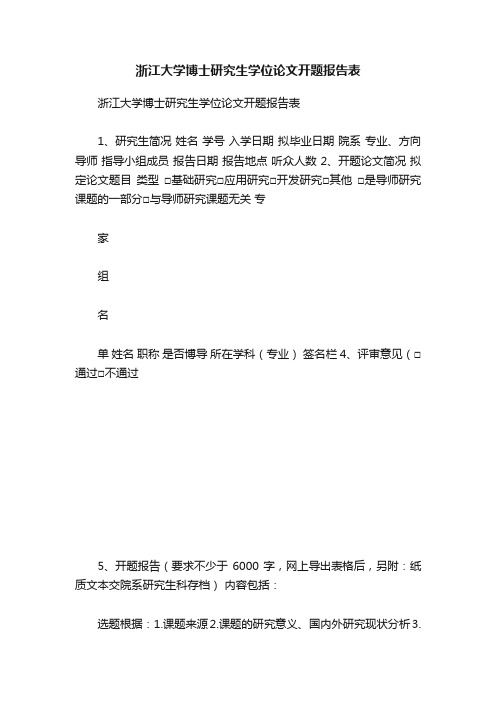
浙江大学博士研究生学位论文开题报告表浙江大学博士研究生学位论文开题报告表
1、研究生简况姓名学号入学日期拟毕业日期院系专业、方向导师指导小组成员报告日期报告地点听众人数
2、开题论文简况拟定论文题目类型□基础研究□应用研究□开发研究□其他□是导师研究课题的一部分□与导师研究课题无关专
家
组
名
单姓名职称是否博导所在学科(专业)签名栏 4、评审意见(□通过□不通过
5、开题报告(要求不少于6000字,网上导出表格后,另附:纸质文本交院系研究生科存档)内容包括:
选题根据:1.课题来源2.课题的研究意义、国内外研究现状分析3.
主要参考文献
研究方案:1.研究目标、内容和拟解决的关键问题
2.拟采取的研究方法、技术路线、试验方案及可行性分析
3.研究的创新点
4.研究计划及预测进展
5.预期研究成果
研究基础:
与本项目有关的研究工作积累和已取得的研究工作成绩(报告者本人的单独列出)、
2.已具备的实验、资料等条件,尚缺少的实验、资料条件和拟解决的途径指导教师(组)意见:
指导教师(签名):
年月日说明:1、开题报告请另附纸;
2、博士生开题报告在6000字以上;
3、本表需归入档案,请用黑色、蓝色墨水钢笔填写。
江苏省普通高校研究生科研创新计划申报项目汇总表(省立省资助)【模板】

3
姜晶花
女
1978.11
思想政治教育
030505
转型期我国企业道德责任培育研究
博士
4
鹿晓红
女
1969.6
马克思主义哲学
010100
马克思主义对主奴关系的终结
博士
5
张娟
女
1973.1
思想政治教育
030505
基于物联网的新媒体德育研究
博士
6
余保刚
男
1976.1
马克思主义基本原理
030501
消费主义思潮对我国意识形态建设的影响与对策研究
求解ODEs和DAEs系统的预处理的波形松弛法
博士
55
王春梅
女
1982.1
计算数学
070102
求解重调和方程的弱Galerkin有限元方法
博士
56
梅书原
男
1986.8
基础数学
070101
和集及正规数等数论问题的研究
博士
57
李海燕
女
1988.4
基础数学
070101
图的平衡划分
博士
58
唐童
男
1989.12
博士
22
曹珊
女
1988.2
比较教育学
040104
高等教育劳动力市场视角的美国人才培养变革研究
博士
23
陶李
女
1982.12
职业技术教育
040108
青少年技术素养内涵及测评研究
博士
24
唐燕
女
1985.12
德育学
040121
道德教育的“迷”与“谜”——论作为生活方式的道德教育
博士科研计划书模板(医学)
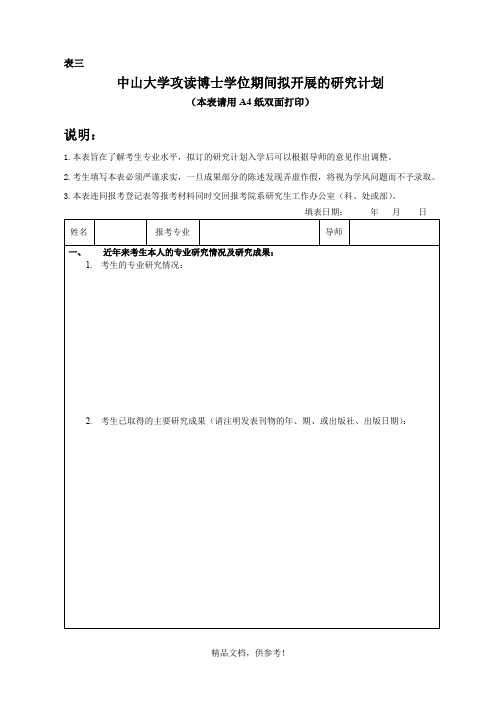
表三
中山大学攻读博士学位期间拟开展的研究计划
(本表请用A4纸双面打印)
说明:
1.本表旨在了解考生专业水平,拟订的研究计划入学后可以根据导师的意见作出调整。
2.考生填写本表必须严谨求实,一旦成果部分的陈述发现弄虚作假,将视为学风问题而不予录取。
3.本表连同报考登记表等报考材料同时交回报考院系研究生工作办公室(科、处或部)。
注:本页不够填写时可加附页
中山大学研究生院制
(此文档部分内容来源于网络,如有侵权请告知删除,文档可自行编辑修改内容,供
参考,感谢您的支持)。
天津大学硕士博士研究生开题报告(新20190510)
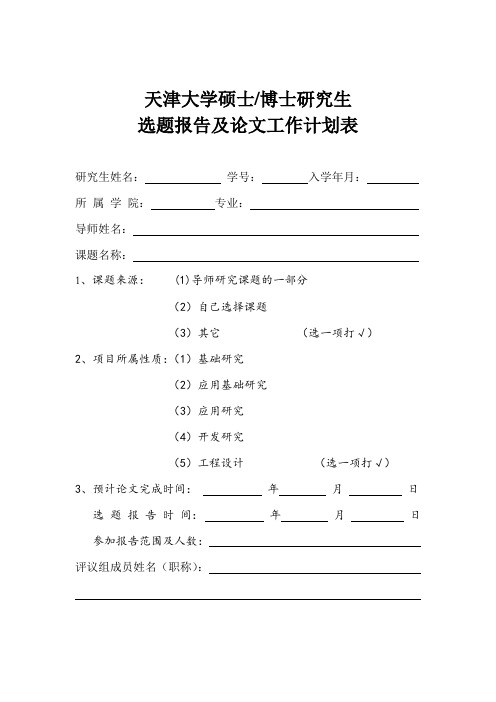
4、导师意见:
同意开题
不同意开题
导师签字:年 月 日
5、选题报告会评议组意见:
同意开题
不同意开题
组长(签字):年 月 日
6、学院审核意见:
同意开题
不同意开题
学院(公章) 主管院长(签字):年 月 日
天津大学硕士/博士研究生
选题报告及论文工作计划表
研究生姓名:学号:入学年月:
所属学院:专业:
导师姓名:
课题名称:
1、课题来源:(1)导师研究课题的一部分
(2)自己选择课题
(3)其它(选一项打√)
2、项目所属性质:(1)基础研究
(2)应用基础研究
(3)应用研究
(4)开发研究
(5)工程设计 (选一项打√)
3、预计论文完成时间:年月日
选 报 告 时 间:年月日
参加报告范围及人数:
评议组成员姓名(职称):
1、拟选课题国内、外的研究动态、水平、存在问题,并附主要参考文献:
2、课题拟解决的主要技术问题,在理论和应用方面的意义,完成课题的条件(包括个人业务水平、教研室或学科组的技术、设备条件)和拟采取的技术措施和办法:
博士学位授权一级学科简况表
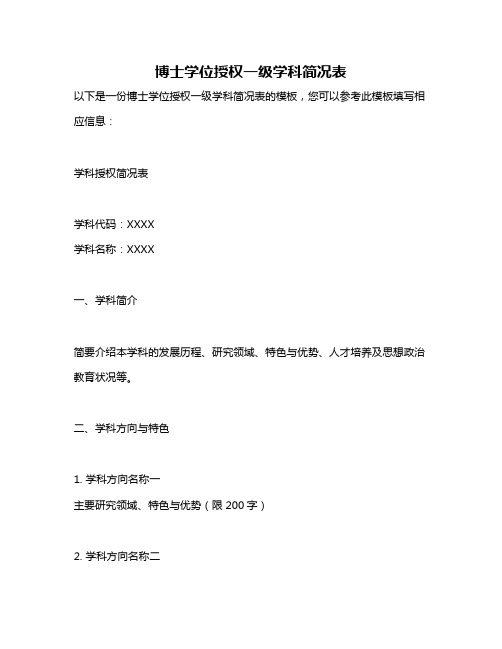
博士学位授权一级学科简况表
以下是一份博士学位授权一级学科简况表的模板,您可以参考此模板填写相应信息:
学科授权简况表
学科代码:XXXX
学科名称:XXXX
一、学科简介
简要介绍本学科的发展历程、研究领域、特色与优势、人才培养及思想政治教育状况等。
二、学科方向与特色
1. 学科方向名称一
主要研究领域、特色与优势(限200字)
2. 学科方向名称二
主要研究领域、特色与优势(限200字)
三、近五年成果统计
论文:XX篇(其中SCI/EI收录XX篇)
专著:XX部
专利:XX项(其中发明专利XX项)
科研奖项:XX项(其中省部级以上XX项)
教学成果:XX项(其中省部级以上XX项)
四、科研项目与经费
近五年承担的科研项目情况,包括项目名称、项目来源、经费等。
五、学科队伍情况
1. 教授/研究员人数:XX人
2. 副教授/副研究员人数:XX人
3. 博士/硕士生导师人数:XX人
4. 学科带头人及后备人选情况:姓名、研究方向、学术成果等。
六、教学与人才培养情况
1. 博士/硕士研究生招生情况:近五年招生人数、研究方向等。
2. 博士/硕士研究生培养情况:培养方案、课程设置、实践环节等。
3. 博士/硕士研究生毕业情况:毕业人数、就业去向等。
七、条件支撑与保障情况
1. 实验室/科研平台建设情况:面积、设备、研究成果等。
2. 图书资料情况:馆藏图书、数字资源等。
3. 学术交流与合作情况:举办学术会议、参加国际国内学术交流等。
4. 学科评估与认证情况:评估结果、认证情况等。
课题项目结题材料汇总表
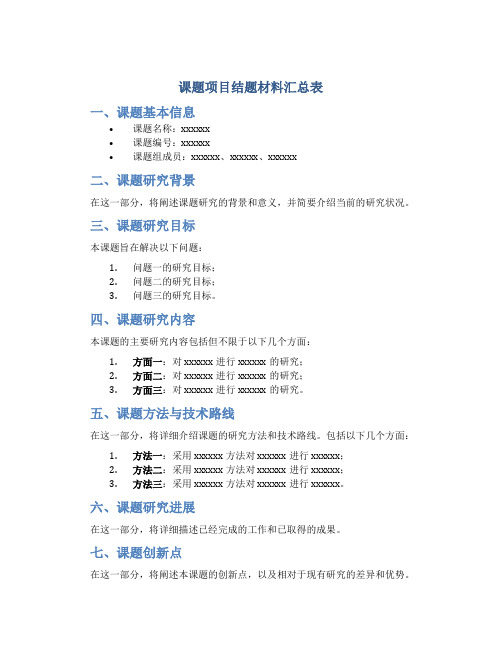
课题项目结题材料汇总表一、课题基本信息•课题名称:xxxxxx•课题编号:xxxxxx•课题组成员:xxxxxx、xxxxxx、xxxxxx二、课题研究背景在这一部分,将阐述课题研究的背景和意义,并简要介绍当前的研究状况。
三、课题研究目标本课题旨在解决以下问题:1.问题一的研究目标;2.问题二的研究目标;3.问题三的研究目标。
四、课题研究内容本课题的主要研究内容包括但不限于以下几个方面:1.方面一:对xxxxxx进行xxxxxx的研究;2.方面二:对xxxxxx进行xxxxxx的研究;3.方面三:对xxxxxx进行xxxxxx的研究。
五、课题方法与技术路线在这一部分,将详细介绍课题的研究方法和技术路线。
包括以下几个方面:1.方法一:采用xxxxxx方法对xxxxxx进行xxxxxx;2.方法二:采用xxxxxx方法对xxxxxx进行xxxxxx;3.方法三:采用xxxxxx方法对xxxxxx进行xxxxxx。
六、课题研究进展在这一部分,将详细描述已经完成的工作和已取得的成果。
七、课题创新点在这一部分,将阐述本课题的创新点,以及相对于现有研究的差异和优势。
八、课题成果与应用前景在这一部分,将阐述本课题的主要成果和应用前景。
九、结题评价在这一部分,将对本课题的研究成果进行客观评价,包括课题的创新性、实际应用价值、科学性等方面。
十、课题总结与展望在这一部分,将对本课题研究的总结和展望进行阐述。
十一、参考文献在这一部分,将列举参考的文献,并按照规范格式进行引用。
十二、附录在这一部分,可以根据需要,提供与课题相关的附加信息,例如原始数据、图表等。
管理科学与工程专业博士研究生课程计划表

管理科学与工程专业博士研究生课程计划表课程背景管理科学与工程是一门综合学科,它研究如何在管理决策中应用数学、统计学和计算机科学等方法和技术,以提高管理效果、决策效率和经济效益等方面的问题。
为了提升博士研究生的专业知识和科研水平,各大高校和研究机构开设了管理科学与工程博士研究生课程。
课程目标本课程旨在培养博士研究生在管理科学与工程领域的专业知识和科研能力,提高其在产业界和学术界的竞争力和应用能力。
课程计划表以下为管理科学与工程专业博士研究生课程计划表的详细内容:第一学年科学研究方法基础课程•研究方法基础•科学思维方法•数据分析方法•研究伦理与规范管理科学与工程基础课程•系统工程导论•运筹学•优化方法与算法•随机过程与应用专业选修课程•管理工程•服务科学与工程•质量管理工程•模拟方法与应用•多目标决策方法第二学年学术研究与知识产权课程•学术写作与发表•知识产权与管理•智慧产业与企业管理•商业模式与创新专业选修课程•大数据分析与决策•建模与仿真•供应链管理•风险管理•信息安全管理实践课程•实验设计与数据分析•系统集成实践•实际工程应用案例研究•企业实习第三学年研究生论文选题及撰写•论文选题与研究方向确定•文献综述与课题研究设计•实验及数据分析•论文撰写与修改课程收益本课程通过科学、系统、专业的理论教育和实践经验的培养,将博士研究生的科研创新和实践能力提升到更高的境界。
他们可以在政府、高校、科研机构等领域担任领导、专家、研究员、顾问等职业,或者进入大型公司、财团、金融机构等进行高级管理和顾问工作。
总体而言,博士研究生可以更好地为产业发展和社会繁荣做出贡献。
研究生学位授予质量分析报告模板(博士)

×××××(201×~201×(此报告每年10月20一、学位论文基本情况 1.研究课题情况本学年度提交的博士研究生学位论文研究课题的基本信息见表1。
表1.学位论文研究课题基本信息注:1.课题类型填写基础、应用基础、其他;2.课题来源填写纵向/级别(例纵向/国家级)、横向、自选等。
2.论文复制比和评阅情况本学年度提交的博士研究生学位论文的复制比检测和评阅结果见表2。
表2.学位论文复制比检测结果注:评阅成绩分别列出三位评阅人给出的成绩。
3.论文答辩情况统计分析本学年度申请答辩的研究生中,学位论文答辩结果分析见表3。
表3.学位论文答辩结果二、研究成果情况1.发表学术论文情况本年度毕业研究生发表的学术论文情况见表4。
表4.毕业研究生发表学术论文统计表注:1.发表的学术论文是指研究生作为第一作者或者导师为第一作者、研究生为第二作者,且作者署名单位为内蒙古工业大学的论文;2.收录情况填写SCI、EI、CPCI、SSCI、CSSCI等。
特殊说明:对取得特殊成绩的可做特殊说明,如SCI一区、二区TOP期刊发表论文,论文获奖等。
2.获批专利/软件著作权情况本年度毕业研究生获得的授权专利/软件著作权情况见表5。
表5.毕业研究生获得专利授权、软件著作权情况统计表注:1.专利、软件著作权必须获得授权;2.在类型中标明发明专利、实用新型专利、外观设计专利或者软件著作权。
特殊说明:对取得特殊成绩的可做特殊说明,如发明专利授权、各类专利转化,获得经济效益等。
三、学术报告情况本年度毕业博士研究生所做学术报告情况见表6。
表6.毕业研究生所做学术报告基本信息表四、学位授予质量分析分别从学位论文(选题、文献综述、创新性、工作量、撰写规范)、论文审查和答辩(复制比检测、评阅、预答辩、答辩)、学术成果、参与学术交流活动等方面进行分析评价。
五、存在问题和改进措施。
课题情况汇总表

课题情况汇总表课题情况汇总表是用于记录和总结课题研究过程中的各种信息和数据的表格。
通过填写课题情况汇总表,可以方便地整理课题的进展情况、研究成果、遇到的问题及解决方案等,为课题的顺利完成提供有力的支持。
一、写作方法1.标题:在表格上方居中写明“课题情况汇总表”。
2.表头:在表格中添加表头,包括日期、课题名称、研究内容、进展情况、遇到的问题及解决方案、下阶段工作计划等。
3.内容填写:根据课题的实际情况,逐项填写表格内容。
对于研究内容,可以细分为研究目标、研究方法、研究成果等;对于进展情况,可以记录已完成的工作、未完成的工作及存在问题;对于遇到的问题及解决方案,可以详细描述问题、分析原因并提出解决方案;对于下阶段工作计划,可以明确目标、任务及时间安排等。
4.总结:在表格最后,可以对课题进展情况进行总结,概括已完成的工作和存在的问题,并提出下一步工作的建议和展望。
二、范文课题情况汇总表日期:XXXX年XX月XX日课题名称:XXX研究研究内容:1.研究目标:探讨XXX的影响因素及干预措施。
2.研究方法:采用文献综述和实证研究方法。
3.研究成果:已完成文献综述,收集了相关数据并进行了初步分析。
进展情况:1.已完成工作:完成了文献综述和数据收集工作,并进行了初步分析。
2.未完成工作:需要进行深入的数据分析和撰写论文。
3.存在问题:数据分析存在一些困难,需要进一步学习和探讨。
遇到的问题及解决方案:5.问题:数据分析存在困难。
6.解决方案:参加相关培训课程,向专家请教,加强团队合作。
下阶段工作计划:1.目标:完成数据深入分析,撰写论文。
2.任务:确定数据分析方法,进行深入分析,整理研究成果。
3.时间安排:预计用1-2个月时间完成数据分析并撰写论文。
优秀博士学位论文培育项目和硕士研究生创新项目汇总表(广西大学土木建筑工程学院)

教授
2012
结构工程
√
火灾(高温)后再细微观锚固机理及粘结滑移性能研究
2
黄沃成
黄沃成、莫林、蒋翊、梁伟英、万翔
陈正
副教授
2012
结构工程
√
非均匀扩散场条件下海洋混凝土结构服役寿命的边界元法研究
3
陆鹏
陆鹏、孟二从、曾文祥、
陈朋朋
苏益声
教授
2012
结构工程
√
方钢管再生混凝土结构梁柱节点抗震性能研究
3
郑巍
郑巍、叶培欢、梁莹、李伊、王欢欢
优秀博士学位论文培育项目
和硕士研究生创新项目汇总表
(按推荐先后顺序排列)
学院名称(盖章):土木建筑工程学院
序号
申请者姓名
课题组人员姓名
申请者导师姓名
年级
所属学科
研究生类别
申请项目名称
博士
硕士
1
陈宇良
陈宇良
陈宗平
教授
2013
结构工程
√
压弯剪扭复合受力SRC柱破坏机理及滞回性能研究
2
李泽深
李泽深
张克实
教授
土木建筑工程学院序号申请者姓名课题组人员姓名申请者导师姓名年级所属学科研究生类别申请项目名称博士硕士1陈宇良陈宇良陈宗平教授2013结构工程压弯剪扭复合受力src柱破坏机理及滞回性能研究地震作用下t型钢半刚性节点损伤性能及理论模型研究基于弹性模量缩减法的桥梁结构两层面承载安全设计与优化高温循环载荷作用下金属材料的微观塑性行为和破坏分析钢筋再生混凝土细微观锚固机理及粘结滑移性能研究2李泽深李泽深张克实教授2012结构工程3欧伟欧伟杨绿峰教授2012结构工程4刘贵龙刘贵龙张克实教授2013结构工程1冯超冯超宁纪源龚马驰孔德辅陈孔邓志恒教授2013结构工程2黄沃成黄沃成莫林蒋翊梁伟英万翔陈正副教授2012结构工程非均匀扩散场条件下海洋混凝土结构服役寿命的边界元法研究3陆鹏陆鹏孟二从曾文祥陈朋朋苏益声教授2012结构工程方钢管再生混凝土结构梁柱节点抗震性能研究3郑巍郑巍叶培欢梁莹李伊王欢欢陈宗平教授2012结构工程火灾高温后再生混凝土及其构件力学性能研究
博士研究生学术活动记录表

北京大学医学部博士研究生学术活动记录表研究生姓名学号年级院(部)专业导师北京大学研究生院医学部分院培养办公室制表填表要求1.此表为医学科学(理学)博士研究生参加学术活动记录用,必须如实填写,字迹要清晰工整。
2.参加学术活动:①讲座或讨论需有主持(讲)人签名。
②作学术报告或展示论文要有记录和相关证明。
3.参加校(医学部)、院(部)组织的学术活动,需在研究生院医学部分院培养办公室备案方予认可;参加全国、地区或国际学术会议者,需提交经导师签字、本院(部)研究生主管办公室审核的会议通知或复印件方予认可。
4.此表作为研究生完成培养要求、审核毕业资格依据之一;申请答辩时,经导师签字交本院(部)研究生主管办公室按有关规定对所填内容进行审核,合格者方可进行毕业论文答辩;毕业时由各院(部)报研究生院医学部分院培养办公室备案。
附:学术活动包含内容及具体学分要求1)参加学术讲座或学术讨论会 7学分参加校(医学部)或院(部)、系组织的学术讲座或学术讨论会 0.2学分/次参加全国或地区性学术会议 0.5学分/次参加在国内举办的国际学术会议 0.5学分/次参加在国外举行的国际学术会议 1.0学分/次在一天内有多位专家做学术报告的学术会议,其学分计算为 0.5学分/半天2)作学术报告或展示论文 3学分在校(医学部)或院(部)、系组织的学术会议上作学术报告 1.0学分/次在全国性或国际性学术会议的墙报上展示论文 1.0学分/次在全国性学术会议的分会上作学术报告 1.5学分/次在全国性学术会议的大会上作学术报告 2.0学分/次在国际学术会议上作学术报告 3.0学分/次参加学术活动记录表作学术报告或展示论文记录表学术活动记录审核表。
博士课题的工作时间表和进度控制

博士课题的工作时间表和进度控制1. 引言本文档旨在制定博士课题的工作时间表和进度控制计划,以确保课题能够按时完成,并保持合理的进展速度。
2. 工作时间表以下是博士课题的工作时间表,按照不同阶段划分:阶段一:文献综述和研究目标确定- 时间范围:第1周至第4周- 工作内容:- 进行广泛的文献综述,了解相关研究的现状和发展趋势- 确定博士课题的研究目标和问题陈述- 预期成果:- 完成详尽的文献综述报告- 确定清晰的研究目标和问题陈述阶段二:研究方法和数据收集- 时间范围:第5周至第12周- 工作内容:- 确定适用于博士课题的研究方法和工具- 开展实证研究,收集相关数据- 预期成果:- 确定合适的研究方法和工具- 完成数据收集并整理成可分析的格式阶段三:数据分析和结果解读- 时间范围:第13周至第20周- 工作内容:- 对收集到的数据进行统计分析和建模- 解读分析结果,验证研究假设- 预期成果:- 完成数据分析和建模报告- 得出初步的研究结论和结果阶段四:论文撰写和修改- 时间范围:第21周至第32周- 工作内容:- 撰写博士论文的各个章节,包括引言、文献综述、方法、结果和讨论等- 根据指导教师的反馈意见进行修改和完善- 预期成果:- 完成初稿和最终版本的博士论文阶段五:答辩准备和完成- 时间范围:第33周至第36周- 工作内容:- 准备博士论文的答辩材料和演讲稿- 完成博士论文答辩- 预期成果:- 顺利完成博士论文答辩3. 进度控制为了控制博士课题的进度并确保按时完成,以下措施将被采取:- 每周与指导教师进行进展汇报和讨论,及时解决遇到的问题和困难;- 设定里程碑和阶段性目标,定期评估课题进展;- 高效管理时间,合理安排每周的工作计划,并适时调整;- 配合教研室和实验室的相关安排和要求,充分利用研究资源;- 严格遵守学术道德和课题研究的相关规定;- 充分利用科研工具和技术,提高研究效率。
4. 结论本文档提供了博士课题的工作时间表和进度控制计划,通过合理安排工作时间和控制进展,有助于确保博士课题的顺利进行并按时完成。
国家自然科学基金青年学生基础研究项目(博士研究生)
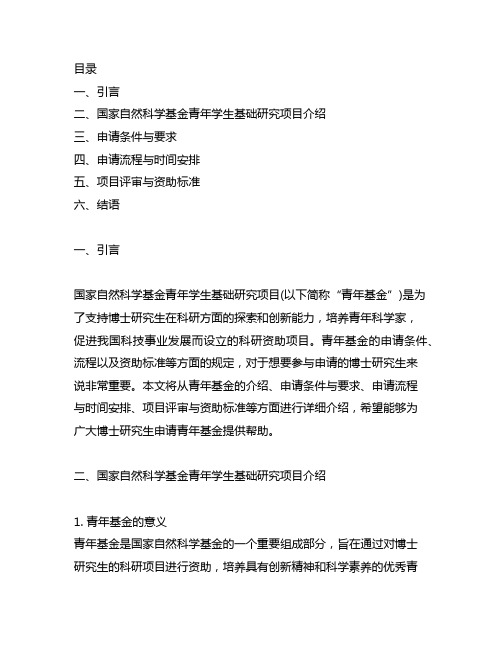
目录一、引言二、国家自然科学基金青年学生基础研究项目介绍三、申请条件与要求四、申请流程与时间安排五、项目评审与资助标准六、结语一、引言国家自然科学基金青年学生基础研究项目(以下简称“青年基金”)是为了支持博士研究生在科研方面的探索和创新能力,培养青年科学家,促进我国科技事业发展而设立的科研资助项目。
青年基金的申请条件、流程以及资助标准等方面的规定,对于想要参与申请的博士研究生来说非常重要。
本文将从青年基金的介绍、申请条件与要求、申请流程与时间安排、项目评审与资助标准等方面进行详细介绍,希望能够为广大博士研究生申请青年基金提供帮助。
二、国家自然科学基金青年学生基础研究项目介绍1. 青年基金的意义青年基金是国家自然科学基金的一个重要组成部分,旨在通过对博士研究生的科研项目进行资助,培养具有创新精神和科学素养的优秀青年科学家,推动我国自然科学研究的发展。
青年基金的设立为广大博士研究生提供了一个展示自己科研能力和学术水平的评台,也为他们未来的发展奠定了良好的基础。
2. 申请范围青年基金的申请范围主要包括自然科学领域,如数学、物理、化学、地球科学、生物学、医学等。
申请者需要根据自己的研究方向选择适合的项目类别进行申请。
3. 资助方式青年基金的资助方式主要有课题资助和个人资助两种。
课题资助是指资助固定的科研课题,个人资助则是资助个人科研项目。
申请者可以根据自己的科研情况选择适合的资助方式进行申请。
三、申请条件与要求1. 申请资格(1)申请者须为在读博士研究生,芳龄一般不超过35周岁。
(2)研究生导师为申请者提供必要的指导和支持,并同意申请者的科研项目。
(3)申请者需具有扎实的专业基础知识,有一定的科研能力和创新意识。
2. 申请要求(1)科研课题具有一定的创新性和前瞻性,符合基金项目的主题要求。
(2)申请者需具备扎实的理论基础和实验能力,有能力独立完成科研项目。
(3)申请材料的真实性和完整性,如项目申请书、研究计划、预算等均需符合基金的要求。
博士毕业课题
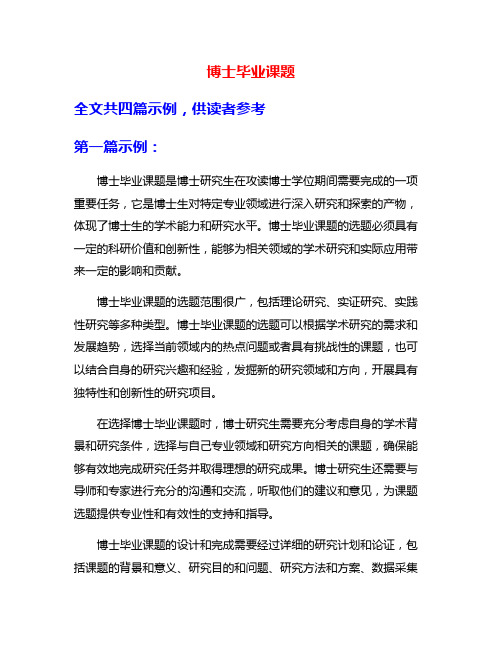
博士毕业课题全文共四篇示例,供读者参考第一篇示例:博士毕业课题是博士研究生在攻读博士学位期间需要完成的一项重要任务,它是博士生对特定专业领域进行深入研究和探索的产物,体现了博士生的学术能力和研究水平。
博士毕业课题的选题必须具有一定的科研价值和创新性,能够为相关领域的学术研究和实际应用带来一定的影响和贡献。
博士毕业课题的选题范围很广,包括理论研究、实证研究、实践性研究等多种类型。
博士毕业课题的选题可以根据学术研究的需求和发展趋势,选择当前领域内的热点问题或者具有挑战性的课题,也可以结合自身的研究兴趣和经验,发掘新的研究领域和方向,开展具有独特性和创新性的研究项目。
在选择博士毕业课题时,博士研究生需要充分考虑自身的学术背景和研究条件,选择与自己专业领域和研究方向相关的课题,确保能够有效地完成研究任务并取得理想的研究成果。
博士研究生还需要与导师和专家进行充分的沟通和交流,听取他们的建议和意见,为课题选题提供专业性和有效性的支持和指导。
博士毕业课题的设计和完成需要经过详细的研究计划和论证,包括课题的背景和意义、研究目的和问题、研究方法和方案、数据采集和分析、论证和验证等内容,确保研究的科学性和可行性。
博士研究生在研究过程中需要不断地进行实验和试验,收集和整理相关的数据和资料,运用专业的统计和分析工具进行数据处理和解释,撰写和提交研究论文。
博士毕业课题的完成不仅需要博士研究生具有扎实的学术功底和研究能力,还需要具有良好的学术道德和团队精神,能够遵守学术规范和研究伦理,尊重他人的学术成果和知识产权,尊重研究对象的权益和隐私,保护研究数据和资料的安全和保密。
博士毕业课题是博士研究生攻读博士学位过程中的重要环节和关键任务,它不仅是对自己学术能力和研究水平的一次挑战和检验,也是为学术研究和实践应用做出贡献和推动发展的重要平台和机会。
博士研究生应该认真对待博士毕业课题的设计和完成,努力提高自身的学术水平和研究能力,为自己的学术梦想和职业目标奋斗和拼搏。
2011年博士点基金名单(新教师类)

申请学校 东南大学 山东大学 中国海洋大学 武汉大学 华中科技大学 中南大学 中山大学 中山大学 华南理工大学 四川大学 四川大学 西南大学 重庆大学
申请人 李铁香 纪广华 岳跃利 吴远山 刘显明 周岳 杨志景 苑占江 张梅 胡文传 张加劲 张双虎 张志民
学科组名称 数学 数学 数学 数学 数学 数学 数学 数学 数学 数学 数学 数学 数学 数学 数学 数学 数学 数学 数学 数学 数学
2011年度高等学校博士学科点专项科研基金资助课题名单(新教师类)
序号 1 2 3 4 5 6 7 8 9 10 11 12 13 14 15 16 17 18 19 20 21 22 课题编号 20110001120111 20110001120112 20110001120113 20110003120003 20110009120025 20110031120001 20110031120002 20110031120003 20110032120074 20110041120038 20110041120039 20110061120003 20110061120004 20110061120005 20110061120006 20110071120001 20110071120002 20110071120023 20110072120008 20110073120068 20110073120069 20110076120002 课题名称 几个带周期边值条件的非线性发展方程的 Cauchy问题 非线性Dirac方程的计算和分析 大规模稀疏模型的快速算法以及高维非凸 稀疏模型的理论分析 树的剪切以及随机树的尺度极限 微分动力系统与奇点相关的大范围性质及 其应用 解析挠率中的几个问题的研究 组合多项式的对数凹与单纯复形 相依风险模型中的渐近理论及其应用 热弹性网络系统的稳定性分析 II1型因子中的若干问题 几类矩阵锥优化问题的增广拉格朗日方法 二阶振动方程的周期解与稳定性 基于秩的稳健经验似然 基于随机矩阵理论的高维典则相关分析 齐次型的华林问题及其对Jacobi猜想的应 多参数正则化方法的理论和计算研究 参数化平行平均曲率子流形的Bernstein 问题和Chern问题的研究 两阶段抽样设计中数据分析的经验似然方 新型网格缩减基与球型解码算法及其应用 关于格路及其均匀分布的研究 正交约束优化问题及其应用 GL(2)的可容许Banach表示研究 申请学校 北京大学 北京大学 北京大学 北京师范大学 北京交通大学 南开大学 南开大学 南开大学 天津大学 大连理工大学 大连理工大学 吉林大学 吉林大学 吉林大学 吉林大学 复旦大学 复旦大学 复旦大学 同济大学 上海交通大学 上海交通大学 华东师范大学 申请人 郭紫华 邵嗣烘 贾金柱 何辉 朱圣芝 苏广想 王星炜 李津竹 韩忠杰 房军生 肖现涛 梁树青 刘天庆 姜丹丹 刘大艳 陆帅 杨翎 郁文 许威 马俊 文再文 谢兵永 学科组名称 数学 数学 数学 数学 数学 数学 数学 数学 数学 数学 数学 数学 数学 数学 数学 数学 数学 数学 数学 数学 数学 数学 课题类型 新教师类 新教师类 新教师类 新教师类 新教师类 新教师类 新教师类 新教师类 新教师类 新教师类 新教师类 新教师类 新教师类 新教师类 新教师类 新教师类 新教师类 新教师类 新教师类 新教师类 新教师类 新教师类 资助额度 (万元) 4 4 4 4 4 4 4 4 4 4 4 4 4 4 4 4 4 4 4 4 4 4
研究生课题研究计划表
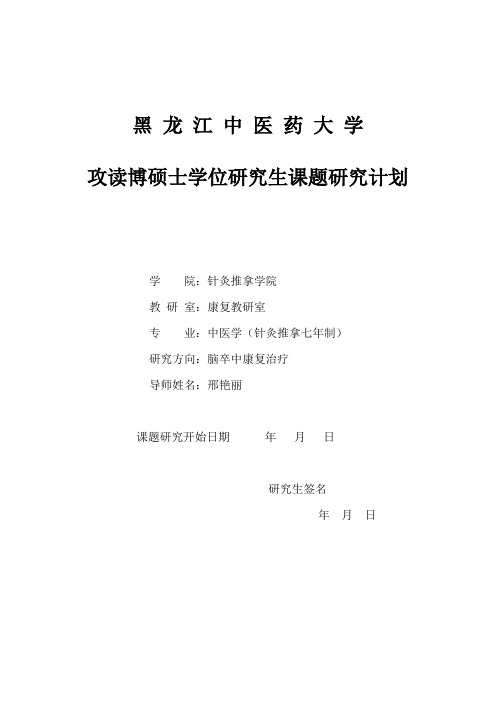
黑龙江中医药大学
攻读博硕士学位研究生课题研究计划
学院:针灸推拿学院
教研室:康复教研室
专业:中医学(针灸推拿七年制)
研究方向:脑卒中康复治疗
导师姓名:邢艳丽
课题研究开始日期年月日
研究生签名
年月日
说明
一、本计划由研究生本人在向教研室(研究室)作过开题报告后填写,送研究生处。
二、计划批准后非经同样手续不得随意更改。
三、在课题执行过程中系和教研室应检查两次。
检查情况及变动情况应记录在表内。
检查及变动情况记录
级士研究生开题情况一览表。
csc联合培养博士英文研究计划表格

csc联合培养博士英文研究计划表格全文共10篇示例,供读者参考篇1Title: My Journey with the CSC Joint Ph.D. ProgramHi everyone! My name is Amy and I am so excited to share with you all about my experience with the CSC Joint Ph.D. Program. This program is super cool because it allows me to study and do research in both China and another country at the same time. How awesome is that?First of all, let me tell you about how I got into this program.I had to apply and go through a rigorous selection process, but it was totally worth it. I was so happy when I got accepted! I am now a proud member of the CSC Joint Ph.D. Program, studying English literature.One of the best things about this program is that I get to work with amazing professors and researchers from both China and my host country. They are all so smart and inspiring, and I have learned so much from them already. I also get to attend conferences and workshops, where I can share my research andlearn from others in my field. It's really cool to be a part of such a global academic community.In addition to all the academic stuff, I also get to experience different cultures and make friends from all over the world. I have made so many new friends in this program, and we have so much fun exploring the cities we live in, trying new foods, and learning each other's languages. It's an amazing experience that I will never forget.Overall, the CSC Joint Ph.D. Program has been an incredible journey for me. I have grown so much as a researcher, as a student, and as a person. I am so grateful for this opportunity and I can't wait to see where this program will take me next. Thank you, CSC, for this amazing experience!篇2CSCHello everyone! My name is Emily and I am a primary school student. Today, I want to share with you about my research plan for the CSC joint doctoral program.Research Topic:My research topic is about the impact of climate change on polar bears. I chose this topic because I love animals and I want to learn more about how we can protect them from the effects of climate change.Research Objectives:1. To understand the current situation of polar bears in the Arctic region.2. To study the factors that contribute to climate change and how they affect polar bears.3. To explore possible solutions to help conserve polar bear populations.Research Methods:1. Literature review: I will read books, articles, and research papers about polar bears and climate change to gather information.2. Field research: If possible, I would like to visit the Arctic region to observe polar bears in their natural habitat.3. Data analysis: I will analyze data collected from scientific studies to support my research findings.Research Timeline:- Conduct literature review: September to November- Field research (if possible): December to February- Data analysis: March to May- Thesis writing and presentation: June to AugustExpected Outcome:By the end of my research project, I hope to have a better understanding of the challenges faced by polar bears due to climate change. I also aim to propose practical solutions that could help protect polar bear populations in the future.Conclusion:I am excited to embark on this research journey and I look forward to sharing my findings with the scientific community. Thank you for reading my research plan for the CSC joint doctoral program. Let's work together to save the polar bears!篇3Title: My Plan for the CSC Joint Ph.D. English Research ProgramHi everyone! My name is Lily and I am so excited to share with you my plan for the CSC Joint Ph.D. English ResearchProgram. I love reading and writing in English, and I can't wait to start my research and become a real English expert!Here is my schedule for the research program:1. Choose a Research Topic: I want to research the representation of gender in classic English literature. I think it's really interesting to see how male and female characters are portrayed in stories from different time periods.2. Research Proposal: I will write a detailed proposal outlining my research questions, methodology, and expected outcomes. I want to make sure that my research is thorough and meaningful.3. Literature Review: I will spend time reading and analyzing previous studies on gender representation in literature. I want to build on existing research and contribute something new to the field.4. Data Collection: I plan to collect data by reading and analyzing classic English novels, poems, and plays. I will take detailed notes and look for patterns in the way male and female characters are depicted.5. Data Analysis: I will use qualitative research methods to analyze my data and draw conclusions about the representationof gender in classic English literature. I want to make sure that my findings are accurate and reliable.6. Writing and Publishing: Once my research is complete, I will write a thesis detailing my findings and conclusions. I hope to publish my work in a reputable academic journal and share my research with the world.I am so excited to start my research and become a real expert in English literature. I know that it will be a lot of hard work, but I am ready for the challenge. Thank you for supporting me on this amazing journey! Let's do this!That's all for now! Thank you for reading my plan for the CSC Joint Ph.D. English Research Program. I can't wait to get started and become a real English expert! Bye for now!Love,Lily篇4csc:Hi everyone! Today I want to talk about my research plan for the joint doctoral program with CSC. I am super excited to sharewith you all the cool things I am going to study and explore in the coming years.Research Area: My research will focus on sustainable energy solutions and renewable resources. I am passionate about finding ways to protect our planet and make sure we have a clean and green future.Research Objectives: My main objective is to develop new technologies and methods for harnessing renewable energy sources such as solar and wind power. I also want to investigate ways to improve energy efficiency and reduce carbon emissions.Research Methodology: I will conduct experiments, simulations, and data analysis to study the feasibility and effectiveness of different energy solutions. I will also collaborate with experts in the field to gain valuable insights and perspectives.Research Timeline: I plan to complete my research project within four years, with regular updates and progress reports along the way. I will also attend conferences and workshops to present my findings and learn from other researchers.Expected Outcome: By the end of my research, I hope to have developed innovative solutions that can be applied inreal-world settings to promote sustainable development and combat climate change.Overall, I am excited and ready to embark on this research journey with CSC. I look forward to learning, growing, and making a positive impact on our world. Let's go save the planet together! Thank you for your support!篇5Title: My CSC Joint PhD Program Study PlanHi everyone! My name is [Your Name] and I'm so excited to share with you my study plan for the CSC Joint PhD Program. I can't wait to start this amazing journey and learn so many new things!1. IntroductionI will be studying [Your Major] at [Your University] as part of the CSC Joint PhD Program. My goal is to become an expert in my field and make a difference in the world through my research.2. Research TopicI will be focusing on [Your Research Topic], which is a topic that I am really passionate about. I believe that my research can contribute to the field and help solve important problems.3. Research GoalsMy main goal is to complete my PhD degree and publish at least three research papers in top journals. I also want to attend international conferences and network with other researchers in my field.4. Study PlanI will spend the first year of my PhD program taking courses and conducting a literature review. In the second year, I will begin my research project and collect data. By the third year, I hope to have completed my data analysis and started writing my dissertation. I plan to defend my dissertation in the fourth year and graduate with my PhD degree.5. Resources NeededI will need access to research facilities, libraries, and databases to support my research. I will also need funding for conference travel and research expenses.6. TimelineYear 1: Take courses and conduct literature reviewYear 2: Begin research project and collect dataYear 3: Complete data analysis and start writing dissertationYear 4: Defend dissertation and graduate with PhD degreeI am so grateful for the opportunity to participate in the CSC Joint PhD Program and I can't wait to get started on my research. Thank you for your support and encouragement!That's my study plan for the CSC Joint PhD Program. I hope you enjoyed reading it as much as I enjoyed writing it. Thank you for listening!篇6Title: My CSC Joint Doctoral Training Program PlanHello everyone! I'm so excited to share with you all my plan for the CSC Joint Doctoral Training Program. It's going to be an amazing journey full of learning and growth. Let's dive into my plan!1. Goals:- To deepen my knowledge and expertise in my field of study- To develop strong research skills and methodologies- To enhance my critical thinking and analytical abilities- To build a strong network of international collaborators- To contribute to the advancement of knowledge in my field2. Research Topic:I will focus on exploring the impact of climate change on biodiversity conservation in tropical rainforests. This topic is crucial in today's world as we face increasing environmental challenges. I aim to produce innovative and impactful research that will contribute to sustainable conservation efforts.3. Timeline:- Year 1: Literature review and research proposal development- Year 2: Data collection and analysis- Year 3: Thesis writing and defense4. Training Plan:- Attend workshops and conferences on research methods and techniques- Collaborate with international researchers on joint projects- Participate in fieldwork expeditions to collect data- Take online courses on relevant topics to enhance my knowledge5. Expected Outcomes:- A well-written and well-researched doctoral thesis- Publications in reputable scientific journals- Presentation of research findings at international conferences- Formation of strong collaborations with researchers around the worldI can't wait to start this incredible journey and make the most of this opportunity to further my academic and professional development. With hard work, dedication, and passion, I know I can achieve great things in the CSC Joint Doctoral Training Program. Let's do this!篇7Okie dokie! Here is a super cool and fun article about the CSC joint doctoral training program. Check it out!Yo yo yo, what's up my peeps! Today, I wanna tell you all about this totally awesome program called the CSC Joint Doctoral Training Program. It's like, the raddest thing ever for all us smart cookies who wanna become super-duper brainy experts in English research.So, like, first things first, let me break it down for ya. The CSC Joint Doctoral Training Program is this mega cool program where you get to study all kinds of cool stuff related to English research. You get to work with experts in the field, learn all the latest and greatest research methods, and just be all around awesome at what you do.But wait, there's more! Not only do you get to become a total English research guru, but you also get to do it at some of the most top-notch universities in the world. Like, we're talking about universities that are like, super famous and stuff. How cool is that?Oh, and get this, you also get to travel to different countries and meet all kinds of rad people who are just as passionate about English research as you are. It's like a big ol' English research party, and you're totally invited!So, if you're a total smarty pants who's all about English research and wanna take your brain power to the next level, then the CSC Joint Doctoral Training Program is definitely the bomb dot com. Trust me, you won't regret it.Alright, my peeps, that's all I gotta say about the CSC Joint Doctoral Training Program. So go out there, be awesome, and show the world what you're made of. Peace out!篇8Title: My Plan for CSC Jointly Cultivated PhD ProgramHey everyone! I want to share with you my plan for the CSC Jointly Cultivated PhD Program. I'm super excited about this opportunity and can't wait to start my research journey! Here's my plan:1. Research Topic:I will be focusing on exploring the impact of technology on early childhood education. I'm really interested in how things like tablets and interactive whiteboards are changing the way kids learn.2. Research Goals:- To conduct a comprehensive literature review on the topic- To design and conduct experiments in schools to gather data- To analyze the data and draw conclusions- To write a thesis based on my findings3. Research Timeline:- Year 1: Literature review and proposal writing- Year 2: Data collection and analysis- Year 3: Thesis writing and defense4. Research Methods:I plan to use a combination of qualitative and quantitative research methods. This will include surveys, interviews, observations, and statistical analysis.5. Expected Outcomes:I hope that my research will contribute to the field of education by providing insights into the benefits and challenges of technology in early childhood education. I also hope to develop recommendations for teachers and policymakers.Overall, I'm really looking forward to this research journey and the opportunity to learn and grow as a researcher. I know it will be a lot of hard work, but I'm ready to take on the challenge! Thank you for your support and encouragement. Let's do this!篇9CSCHi everyone! I'm so excited to share with you all my research plan for the joint PhD program with CSC. It's going to be an awesome journey and I can't wait to get started!Research Area:I will be working in the field of Environmental Science, focusing on the impact of climate change on biodiversity.Research Objectives:1. To investigate how climate change is affecting different species of plants and animals.2. To understand the mechanisms behind the changes in biodiversity.3. To develop strategies for conservation and adaptation in response to climate change.Research Methods:1. Field surveys to assess the current status of biodiversity in different ecosystems.2. Laboratory experiments to study the physiological and behavioral responses of species to changing environmental conditions.3. Data analysis using statistical models to identify patterns and trends in biodiversity loss or gain.Research Timeline:Year 1:- Literature review on climate change and biodiversity.- Fieldwork to collect baseline data on species diversity.- Begin preliminary analysis of data.Year 2:- Continue field surveys and experiments.- Analyze data and write up results for publication.- Present findings at conferences.Year 3:- Finalize data analysis and write up dissertation.- Defend thesis and complete PhD program requirements.Overall, I am committed to conducting high quality research that will contribute to our understanding of the impacts of climate change on biodiversity. I am grateful for the opportunity to participate in this joint PhD program with CSC and lookforward to making a positive impact in the field of Environmental Science. Thank you for your support and encouragement throughout this journey!篇10Title: My Fun and Exciting Journey with the CSC Joint Doctoral Training ProgramIntroduction:Hello everyone! My name is Jenny, and I am so excited to share with you all about my amazing journey with the CSC Joint Doctoral Training Program. This program is a fantastic opportunity for me to pursue my dreams of becoming a successful English researcher. Are you ready to join me on this fun and exciting adventure? Let's get started!Research Interests:I have always been passionate about English literature and language. I love reading and analyzing classic novels, poems, and plays. With the CSC Joint Doctoral Training Program, I hope to delve deeper into the world of English literature and make significant contributions to the field.Research Plan:In the first year of the program, I will focus on taking advanced courses in English literature and research methodologies. I will also work closely with my mentors to develop a strong research proposal for my dissertation.In the second year, I plan to conduct extensive research on a specific topic related to English literature. I will analyze important texts, gather data, and write insightful papers that contribute to the existing body of knowledge.During the third and fourth years, I will write my dissertation and defend it before a panel of experts. I am confident that my research will make a valuable contribution to the field of English literature.Extracurricular Activities:Apart from my research, I also plan to participate in various extracurricular activities. I will attend conferences, workshops, and seminars to enhance my knowledge and skills. I will also join academic clubs and societies to collaborate with other researchers and exchange ideas.Conclusion:I am so grateful for the opportunity to be a part of the CSC Joint Doctoral Training Program. This program will not only helpme achieve my academic goals but also broaden my horizons and make lifelong friendships. I am ready to embark on this exciting journey and make a difference in the world of English research. Thank you for joining me on this amazing adventure! Let's make our dreams come true together!。
工科博士研究生研究计划书模板 知乎

工科博士研究生研究计划书模板知乎
第一部分:研究题目
标题:某某某领域某某某问题的研究
第二部分:选题背景及意义
(一)选题背景
(二)问题意义
(三)国内外研究现状及相关成果
第三部分:研究内容及方法
(一)研究内容
(二)研究方法
第四部分:预期成果及创新点
(一)预期成果
(二)研究创新点
第五部分:研究计划及时间安排
(一)研究计划
1.任务分解
2.步骤与时间表
(二)可行性分析
(三)组织实施
第六部分:参考文献
参考文献书写规范采用国家标准GB7714-2015。
注意事项:
1.封面为纸质版,作者、指导教师等信息应按要求排版。
2.研究计划书的文字须具备一定的学术表达能力,尽量避免使用符号、图表等。
3.内容应严谨、简明易懂,排版应整洁、美观。
- 1、下载文档前请自行甄别文档内容的完整性,平台不提供额外的编辑、内容补充、找答案等附加服务。
- 2、"仅部分预览"的文档,不可在线预览部分如存在完整性等问题,可反馈申请退款(可完整预览的文档不适用该条件!)。
- 3、如文档侵犯您的权益,请联系客服反馈,我们会尽快为您处理(人工客服工作时间:9:00-18:30)。
羟基自由基氧化脱除燃煤烟气中二氧化硫、氮氧化物并生成酸的绿色方法
12
王珊
大连海事大学环境科学与工程学院
大连海事大学
近海海域赤潮包囊(微小亚历山大藻孢囊和斯氏膝沟藻孢囊)DNA提取技术研究
13
丁倩
大连海事大学环境科学与工程学院
大连海事大学
液相放电法处理船舶压载水机理的研究
14
陈小波
大连理工大学土木水利学院
博士研究生课题汇总表
序号
姓名
单位
依托单位
题目
1
马云峰
东北大学资源与土木学院环境工程研究所
东北大学
基于Petri网的东北制药厂环境现状评价的信息化研究
2
董佳东北大学理学院 Nhomakorabea东北大学
以印迹聚合物为DGT技术ude结合相对水体中酚类物质的测量
3
雷雪飞
东北大学材料与冶金学院
东北大学材料与冶金学院
利用含钛高炉渣制备低成本光催化材料
大连理工大学
辽宁环渤海海域海上风力发电关键技术问题的研究
15
王炜
中科院沈阳应用生态研究所
中科院沈阳应用生态研究所
沈抚同城化区域生态导向分析及优化研究
16
何钦成
中国医科大学
中国医科大学
新型“复合型空气污染”对儿童呼吸系统疾病的影响
中科院沈阳应用生态研究所
冻融作用对土壤中老化多环芳烃环境行为的影响
8
安静
东北大学材料与冶金学院
东北大学
辽宁省硼工业系统诊断及硼铁矿开发方案环境压力分析
9
李胜贤
沈阳农业大学农学院
沈阳农业大学
铁岭市生态农业发展途径研究
10
程经纬
东北大学
抚顺市环境保护局
抚顺市环保办公自动化管理系统研发
11
潘巧媛
大连海事大学环境工程研究所
4
高宇
东北大学环境工程研究所
东北大学
氧化镁基催化吸附剂同时脱硫脱硝及一体化再生方法研究
5
董殿波
中科院沈阳应用生态研究所
中科院沈阳应用生态研究所
土壤中多环芳烃光解途径与影响因素的研究
6
刘周莉
中科院沈阳应用生态研究所
中科院沈阳应用生态研究所
城市重金属污染土壤的藤本植物修复研究
7
赵青
中科院沈阳应用生态研究所
